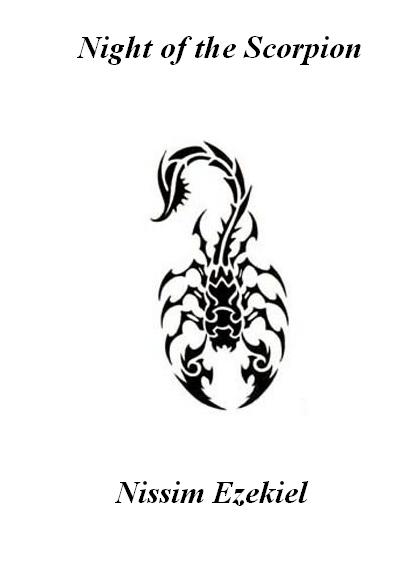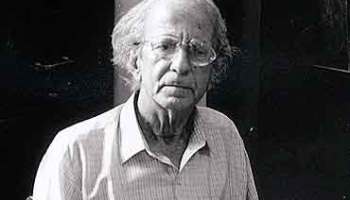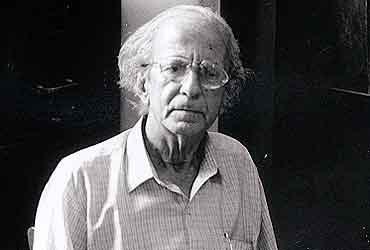Enterprise: Analysis
Every single element that the pilgrims encountered on their journey in this poem symbolizes something else. The sun symbolizations all the obstacles put up by nature in man’s path. The desert symbolizes all the issues because man discriminates against others of his kind, especially religious differences. The shadow that falls on the pilgrims symbolizes the doubt that man feels regarding his beliefs and superstitions. Thunder symbolizes a man’s inner voice. If we uncover all these symbols, we realize that Ezekiel is talking about the test of man’s faith in this poem. He says that organized religion makes a man believe that pilgrimages and donations are important ways of asserting his belief in God. However, the real test of faith comes when a man is confronted by doubt and difficulties. No matter how hard man’s life becomes, he should only listen to his own inner voice and not to that of priests who are supposed to lead their flocks towards salvation. These priests interpret the holy books in such a way that it only benefits them. That is why they make prayer seem complicated. However, the way of faith is simple. Piety begins at home. One must serve his own family and all the creatures of the world that he sees around him if he wants to serve God. Pilgrimages and donations are not at all required to please God. All those practices are futile. The best way to assert one’s faith is to care for our loved ones and see to their every need.
Enterprise: Annotations
Please note: N= noun, V=verb, Adj=Adjective, Adv=Adverb, P=Preposition
Pilgrimage (N): A journey to a sacred place or shrine
Exalting (V): Present participle form of the word “exalt”, that is, to raise to a higher rank or position
Burdens (N): Plural form of the word “burden”, that is, a load, typically a heavy one
Explored (V): Past tense of the word “explore”, that is, to inquire into or discuss (a subject) in detail
Test (V): Reveal the strengths or capabilities of (someone or something) by putting them under strain
Call (N): A powerful force of attraction
Match (V): Be equal to (something) in quality or strength
Rage (N): A vehement desire or passion
Stood (V): Past tense of the word “stand”, that is, to withstand (an experience or test) without being damaged
Observed (V): Past tense of the word “observe”, that is, to notice or perceive (something) and register it as being significant
Copious (Adj): Abundant in supply or quantity
Peasants (N): Plural form of the word “peasant”, that is a poor smallholder or agricultural laborer of low social status (chiefly in historical use or with reference to subsistence farming in poorer countries)
Serpents (N): Plural form of the word “serpent”, that is a large snake
Sage (N): (Especially in ancient history or legend) a profoundly wise man
Patch (N): A small area or amount of something
Prose (N): Written or spoken language in its ordinary form, without metrical structure
Batch (N): A number of things or people regarded as a group or set
Liberty (N): The state of being free within society from oppressive restrictions imposed by authority on one’s behavior or political views
Straggling (Adj): Present participle form of the word “struggle”, that is, (of an irregular group of people) to move along slowly so as to remain some distance behind the person or people in front
Deprived (V): Past participle form of the word “deprive”, that is, to prevent (a person or place) from having or using something
Bent (Adj): Sharply curved or having an angle
Deeds (N): Plural form of the word “deed”, that is action or performance
Rare (Adj): (Of an event, situation, or condition) not occurring very often
Grace (N): A divinely given talent or blessing.
Enterprises: Poetic Devices
Rhyme scheme:
This poem consists of a total of 30 lines, as we have previously said. Its rhyme scheme can be easily detected if we divide the entire poem into 6 units of 5 lines each. If we do so, we will find that each 5 line unit follows this rhyme scheme – ABABA.
Rhetorical devices:
Extended metaphor:
This rhetorical device is used when an author exploits a single metaphor or analogy at length throughout a poem or story. In this poem, the poet uses extended metaphor because the pilgrimage he describes is a symbol of both organized religion in particular and of life in general.
Epigram:
This rhetorical device is used to make a brief, interesting, memorable, and sometimes satirical statement. In this poem, the poet uses the device of epigram in the last line of this poem, that is, in line 30. He teaches his readers that piety begins at home, and we can practice it by caring for our loved ones if we aim to serve God.
Enterprise: Central Idea
The poet describes a pilgrimage that he and some of his fellow men undertook. They were very enthusiastic at the beginning of the journey, and they did not doubt that they would succeed in reaching their destination easily. However, they were soon confronted by many difficulties such as the blazing sun, the arid desert, and attacks from different quarters. Their own unity was also lost. When they finally reached the place of pilgrimage, they were in despair and confused as to why they had come. They realized that they should have stayed at home and practiced their faith and piety there itself.
Enterprise: Theme
Satire on organized religion:
The pilgrimage that Ezekiel describes is actually a parody of organized religion. He says that organized religion is a sham. It tells the man that pilgrimages and donations are the only way to serve God. It tells the man to follow priests blindly and to ignore their own inner voice. Organized religion causes differences among men and is easily doubted. However, if man’s faith comes from within himself, it can never lead him to the wrong track. It will teach him that to serve God, one must serve his loved ones. It will teach him that piety starts at home. Hence, we should shun organized religion and worship God in our own way.
The futility of life:
One interpretation of the poem says that the pilgrimage described by Ezekiel is actually a metaphor for life. In life, we face many difficulties, we become skeptical, and we often quarrel over trivial issues. However, when we are close to death, we realize that all this is futile. The journey of life itself serves no purpose. One man’s life is but an instant in comparison to the life of the universe. We are misguided in our search for meaning in life. Instead, we should focus simply on looking after our loved ones and making the most of our short time on earth.
Enterprise: Tone
The tone of this poem varies frequently from one line to the next. In the beginning, the poet is brimming with enthusiasm. Then when he is beset with difficulties, he starts to lose hope. In the end, he reaches the shrine, but he feels that the journey has been wasted. He is filled with regret when he realizes that home would have been a better place to find one’s faith.
This poem is an allegory, but its purpose is satirical. The poet starts on the pilgrimage hoping to lessen his burdens, but the pilgrimage itself becomes a burden for him. The pilgrimage is undertaken precisely to show how futile pilgrimages are. The message the poet gives us is an important one. It can be summarized in a quote from George A. Moore – “A man travels the world over searching for what he needs and returns home to find it.” Ezekiel’s point is that man searches for faith through pilgrimages and comes to find that it was available at his home all along.
You can also refer to the Summary of Enterprise.
You may also want to look at this Video Playlist to Learn More about this poem in an audio-visual format!
Some online learning platforms provide certifications, while others are designed to simply grow your skills in your personal and professional life. Including Masterclass and Coursera, here are our recommendations for the best online learning platforms you can sign up for today.
The 7 Best Online Learning Platforms of 2022
- Best Overall: Coursera
- Best for Niche Topics: Udemy
- Best for Creative Fields: Skillshare
- Best for Celebrity Lessons: MasterClass
- Best for STEM: EdX
- Best for Career Building: Udacity
- Best for Data Learning: Pluralsight









